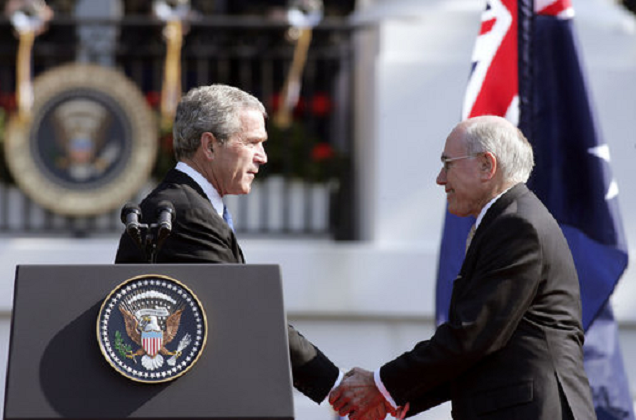John Howard didn’t have too much support from Australian intelligence in deciding to go to war against Iraq.
The Prime Minister got just enough cover from the Office of National Assessments to meet political needs. Beyond politics, though—as a basis for war—the Oz intelligence supporting war was thin stuff.
So thin, in fact, it was wrong. Iraq didn’t pose a threat because it didn’t have the Weapons of Mass Destruction that was the casus belli used by the US, Britain and Australia.
Intelligence is the starting point for this lessons learned exercise, as discussed in the previous column.
Two documents give the details: the Iraq report by the Parliamentary Joint Committee on Intelligence at the end of 2003 (in those days formally titled Joint Committee on ASIO, ASIS and DSD) and then Philip Flood’s Inquiry into Australian Intelligence Agencies in 2004.
The Intelligence Committee found the Defence Intelligence Organisation was sceptical throughout about Iraq’s Weapons of Mass Destruction; on the other hand, the Office of National Assessments (inside the PM’s Department) hardened its line as Howard marched closer to invasion.
The Committee commented on a sudden variation in September 2002, ‘in the nature and tone’ of ONA’s view on Iraq’s WMD:
‘It is so sudden a change in judgement that it appears ONA, at least unconsciously, might have been responding to ‘policy running strong’.’ And by that stage, John Howard was indeed running strong with George W. Bush.
On Iraq’s WMD, Philip Flood lamented ‘a failure rigorously to challenge preconceptions or assumptions about the Iraqi regime’s intentions…there is little evidence that systematic and contestable challenging was applied in a sustained way to analysts’ starting assumptions.’
If you want all this short and sharp, turn to a fine public servant who spent many years in Parliament House serving Parliamentary inquiries—and writing much of what came to be tabled as committee findings.
Margaret Swieringa was secretary of the Parliamentary Intelligence Committee from 2002 to 2007 and was the engine for the Iraq report. In retirement, she offered this terse judgement on whether John Howard ‘lied’ about intelligence on Iraq’s Weapons of Mass Destruction: ‘None of the government’s arguments were supported by the intelligence presented to it by its own agencies. None of these arguments were true.’
This is the way Swieringa summarised the Iraq findings of the Joint Intelligence Committee:
- The scale of threat from Iraq’s weapons of mass destruction was less than it had been a decade earlier.
- Under sanctions that prevailed at the time, Iraq’s military capability remained limited and the country’s infrastructure was still in decline.
- The nuclear program was unlikely to be far advanced. Iraq was unlikely to have obtained fissile material.
- Iraq had no ballistic missiles that could reach the US. Most if not all of the few Scuds that were hidden away were likely to be in poor condition.
- There was no known chemical weapons production.
- There was no specific evidence of resumed biological weapons production.
- There was no known biological weapons testing or evaluation since 1991.
- There was no known Iraq offensive research since 1991.
- Iraq did not have nuclear weapons.
- There was no evidence that chemical weapon warheads for Al Samoud or other ballistic missiles had been developed.
- No intelligence had accurately pointed to the location of weapons of mass destruction.
So the lessons learned on intelligence are the sort of stuff they teach recruits in the induction courses, the verities drenched with blood from Iraq.
Intelligence is always partial, and part will be wrong. The stuff that seems too good to be true often seems good because it isn’t true (a truth as important for journalists as it is for analysts).
The key word that runs through the Flood report is ‘contestability’ (see also here).
Analysts had to be ‘challenged, confronted by different perspectives and alerted to flaws in their arguments.’
In the case of Iraq, ONA ended up building a case for its political master that didn’t really deal with the sceptical questions raised by DIO.
Ironic that such failure resulted in the Oz intelligence community getting big increases in funding for the rest of the decade so it could do a better job thinking about the age of terror.
In a fine discussion in 2011 of what this bigger and richer intelligence community had become, the Director-General of ONA, Allan Gyngell, stressed the point made by Flood, saying analysts ‘must be capable of challenging conventional thinking and, equally, of having their own analysis challenged. ONA is easily the most contestable place in which I’ve ever worked. Our readers can be confident that no piece of product gets out without heavy stress-testing.’
The lesson learned is that the intelligence used to take Australia to any future war needs stress-testing far more rigorous and exacting than occurred before the Iraq war.


